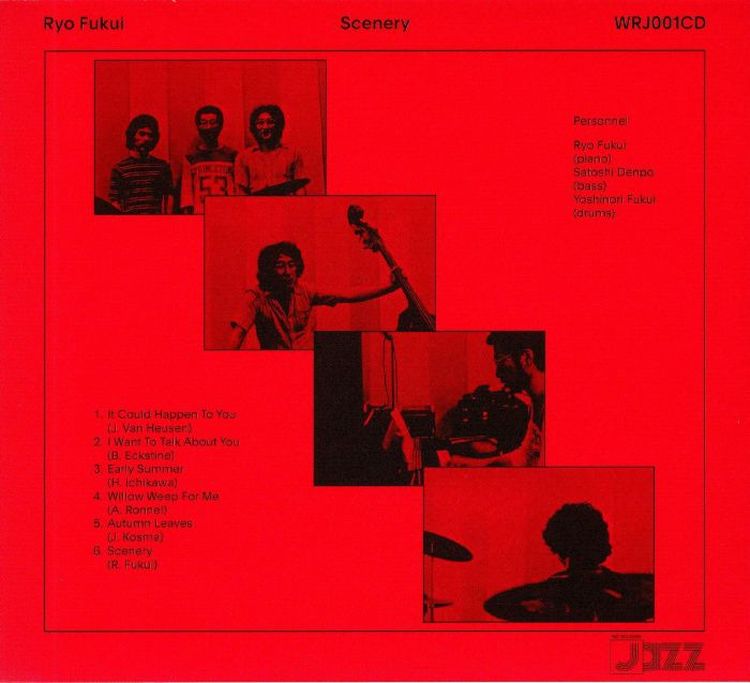
The Hokkaido wizard-pianist followed Scenery with the soulful gem Mellow Dream (also available on We Release Jazz) in 1977. Scenery is his magnum opus and an absolute must-have. Often compared to McCoy Tyner or Bill Evans, Ryo Fukui was a genius in his own right, a true master of his craft whose perfectionism gave birth to some of the greatest music ever recorded. From "It Could Happen To You" and its serene and calm intro which magically flows into a jubilant and upbeat piece, to the out-of-this-world piano solo of "Early Summer", or the incredible teamwork of "Autumn Leaves" where Fukui leads Satoshi Denpo (bass) and Yoshinori Fukui (drums) into groove heaven, every single note on the album oozes precision, confidence and flair and every single section slides seamlessly into one another, creating a supreme and elegant blend of jazz. Unquestionably one of the most important Japanese jazz albums ever recorded, Scenery reveals Ryo Fukui as a miraculously brilliant self-taught pianist fusing modal, bop, and cool jazz influences for a very personal, dexterous and game-changing take on classic standards made famous by Bing Crosby and John Coltrane among others. Looking back at the lovely scenery, it's hard to disagree.We Release Jazz (WRWTFWW Records’ new sister-label) is proud to present its first release, the official reissue of Ryo Fukui’s highly sought-after masterpiece Scenery (1976), sourced from the original masters and available on limited edition 180g vinyl mastered at half speed for audiophile sound, as well as 140g vinyl and digipack CD. Upon its release, it received massive praise and deeply influenced Japan’s music: to this day, people cite it as an undeniable game changer. Ryo’s decision to acknowledge what's already done and build on top of the shoulders of giants only took the quality of Japanese music to a level never seen before. Scenery marks the evolution of Jap-Jazz from experimentalism to a fully fleshed-out form of expression. Clearly, all musicians shine, but the pianist’s unmistakable playing steals the show. This is clearly seen by the fantastic drum solo later in the aforementioned song and on “Autumn Leaves.” Towards the last third of the latter, every instrument lays back to make way to an exquisite bass driven section. However, he somehow leaves room for his group to show off as well. A perfect example is “Early Summer,” in which Ryo crafts beautiful melodies and soon plays one of the greatest piano solos in all of jazz. On Scenery, the piano directed the band’s harmonic focus as it also added a cool, vocal-esque layer on top. His unbelievable playing displays dexterity and skill but also exhibits melodic and rhythmic awareness. Their sound is so full, they may not even strike the listener as a three piece group initially.Įven though Ryo prioritizes composition, he still manages to show his virtuosity. This leads to a very pleasing sound in which the trio perfectly complements each other. All notes seem relevant, and decisions feel like they are taken purposefully. Every section flows seamlessly into one another whilst providing tasteful and rich musicality. The six song album continuously proves that Ryo is the complete master at his craft.

He borrowed elements of post-bop, cool jazz, and even blues to create something unique, something unheard of before: a jazz album that prioritized composition rather than improvisation. While other artists were busy getting to know the textures of music, self-taught pianist Ryo, accompanied by a drummer and a bass player, decided to give his own spin on American jazz.
RYO FUKUI SCENERY HOW TO
The problem with the newborn experimental style of music at the time, however, was that it didn't show how to truly embrace jazz as an art form.īecause of Jap-Jazz’s confused identity, one the genre’s most important albums was Ryo Fukui’s Scenery. As a matter of fact, he and a few others started the now-signature avant-garde Japanese movement, which would explain why so much experimental music comes out of the country. Artists like Miles Davis were already pushing the sound of fusion in the early 70s while Magical Power Mako started doing so later in the decade with a more dissonant, bare style. The main difference was Jap-Jazz wasn't as developed as American jazz. After a few decades, it evolved like it did in the West with slight differences. The genre arrived to the nation due to WWII when American forces stationed in Japan brought and introduced said music from overseas. Japanese jazz, casually known as Jap-Jazz, has had a very interesting history. Review Summary: Oh, how lovely is the scenery.


 0 kommentar(er)
0 kommentar(er)
